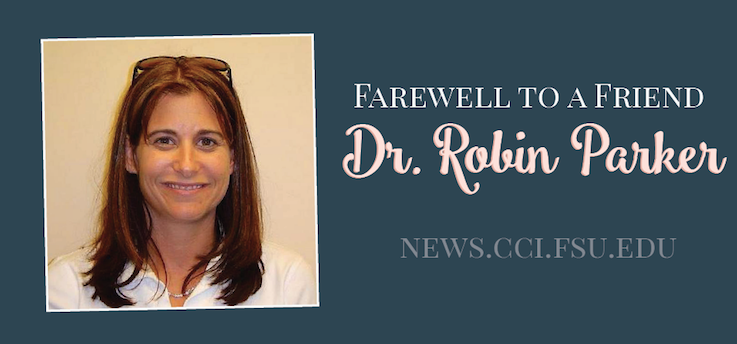
Dr. Robin Parker, Florida State alumna and Nova Southeastern University (NSU) professor, passed away July 16, 2014 at age 50, after a battle with pancreatic cancer. Parker worked with children and adults on the autism spectrum for 25+ years, and helped pioneer treatment for autism through the use of mobile apps.
Recently, Parker was honored at the Florida Association of Speech-Language Pathologists and Audiologists (FLASHA) 2015 Conference in Ft. Lauderdale. Parker was awarded the Honors of the Association, which was accepted on her behalf by Dr. Wren Newman.
“One of Robin’s abilities that always struck me personally was her gift of giving hope. She would see the smallest change in the right direction as a tremendous accomplishment that would provide hope for the family and in fact, typically moved the patient forward beyond what most would think possible,” shared Dr. Newman during his speech.
In 1985, Robin Parker graduated with her Bachelor of Science in Communication Science and Disorders from Florida State. She dove into her Master’s, graduating in 1986. Parker worked with Dr. Amy Wetherby, who helped Parker realize her passion for working with children and adults with autism. After graduation, Parker worked as a Speech-Language Pathologist at Mount Sinai Hospital in New York City.
In 1993, Parker returned to Florida to work at NSU as a professor, teaching primarily in the area of autism. In 1998, she began coursework for her doctorate/SLP.D. at NSU and graduated in 2000. During her studies, Parker unearthed a passion for helping families cope and thrive with autism. Autism’s reach is broad, the neurological disorder leads to difficulty in communicating and socializing with forms ranging from mild to severe.
In 2001, Parker joined the UM-NSU Center for Autism and Related Disabilities (CARD) as a Project Director. She was also a Clinical Supervisor for the Programs in Communication Science and Disorders at Nova Southeastern University. Parker made it her mission to reach as many people as she could.
In 2012, Parker founded the PrAACtical AAC blog with her colleague, Dr. Carole Zangari. The blog strove to improve the level of AAC services available to individuals with significant communication challenges by supporting speech-language pathologists and others. Augmentive/alternative communication (AAC), is defined as any communication other than verbal speech. Examples of AAC include gestures, sign language, picture symbols and speech generating devices.


